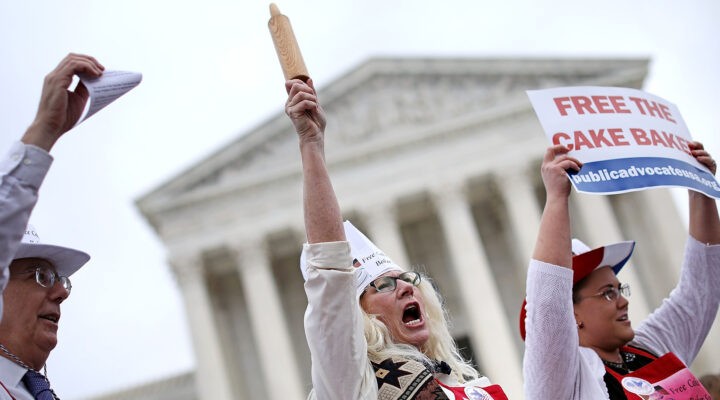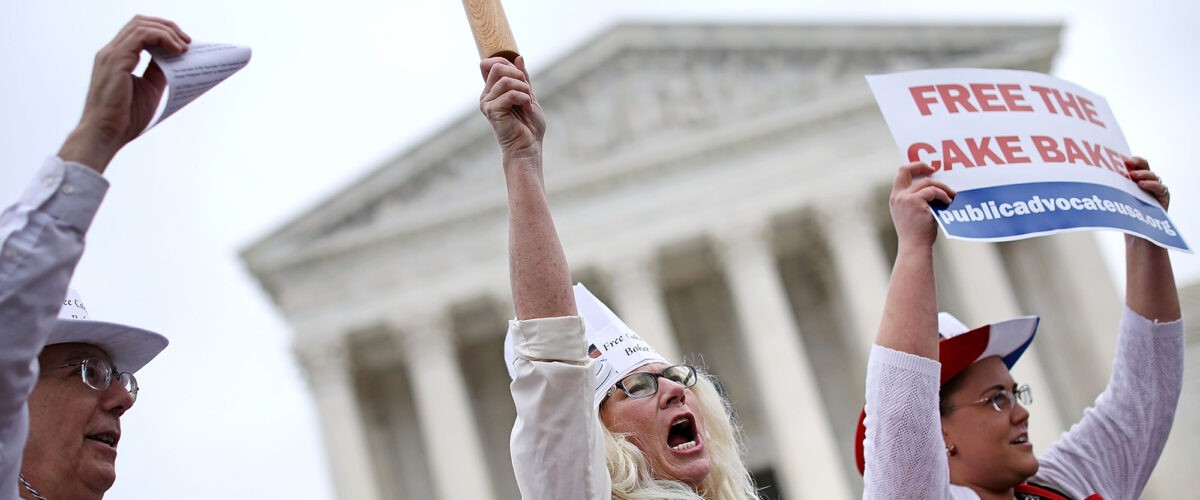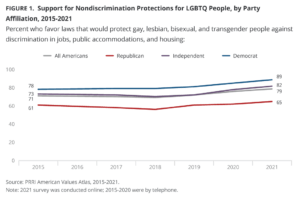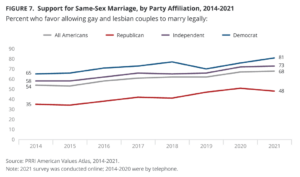While the same-sex marriage now is the law of the land in the United States, white evangelical Christians remain distinct outliers among all Americans in accepting that reality.
This finding from Public Religion Research Institute comes amid a backdrop in which an increasing majority of Americans favor laws that would protect gay, lesbian, bisexual and transgender people against discrimination in jobs, public accommodations and housing.
While the desire for equal protection in these areas cuts across political lines, only about a third of white evangelicals support guaranteeing LGBTQ persons protection against religiously based service refusals. This would include, for example, whether business owners who offer goods and services may refuse to serve LGBTQ customers in anything from health care to wedding cakes.
The net effect of these findings illustrates an even wider gap between the positions of white evangelicals and the rest of America, a reluctance that manifests in the agenda of the modern Republican Party, which is largely controlled by white evangelicals.
The net effect of these findings illustrates an even wider gap between the positions of white evangelicals and the rest of America, a reluctance that manifests in the agenda of the modern Republican Party, which is largely controlled by white evangelicals.
On March 17, PRRI released a new set of data from its omnibus American Values Atlas Project. Surveys were conducted among a representative sample of 22,612 American adults from March through June 2021. The latest survey follows in the path of previous annual PRRI polls so that year-to-year tracking is possible.
Across this span, PRRI has surveyed Americans’ support and opposition to three main LGBTQ rights policies:
- Laws that would protect gay, lesbian, bisexual and transgender people against discrimination in jobs, public accommodations and housing.
- Allowing a small business owner in your state to refuse to provide products or services to gay or lesbian people if doing so would violate their religious beliefs.
- Allowing gay and lesbian couples to marry legally.
Non-discrimination policies
PRRI reports another uptick in the share of Americans who favor laws that would protect gay, lesbian, bisexual and transgender people against discrimination in jobs, public accommodations and housing.
This year, 79% “support” or “strongly support” such an idea. That’s a three-point increase over the prior year, when 76% of American adults said they favor such legislation. However, an even greater increase was found among those who “strongly support” such legislation, up from 34% in 2020 to 41% in 2021.
In contrast, one in five Americans (20%) now say they oppose such laws, including 7% who “strongly oppose” them. Overall opposition has gained one point over the prior year.
The longer-term trend line is toward greater support for non-discrimination protections — up five points since 2015.
Majorities of Democrats (89%), independents (82%) and Republicans (65%) favor nondiscrimination provisions for LGBTQ people.
Support for such protections is lowest among white evangelical Protestants (61%) and Jehovah’s Witnesses (59%). The gap between white evangelical Protestants and America as a whole is 18 points.
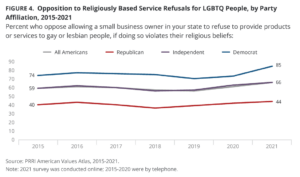
Religiously based service refusals
However, the gap grows wider on the question of whether it should be legal to discriminate against LGBTQ persons if a business owner or service provider has a “religious” reason for denying service.
This question has been at the center of several recent cases that have made it to the U.S. Supreme Court. Evangelical Christians are at the forefront of efforts to ensure that their religious beliefs are more important than protecting minorities against discrimination.
LGBTQ persons and allies often make a case for protection as a basic civil right. No business today would be allowed to refuse service to a person because of the color of their skin, yet they contend being born gay, lesbian, bisexual or transgender is no more in their control than the color of their skin. Religious conservatives contend otherwise, often asserting that LGBTQ identity is a “choice” and therefore not analogous to race.
The legal outcome of this question has not been settled. A previous high-profile case about a wedding cake baker resulted in a narrow ruling specific to that case. However, another similar case will be heard by the high court this year.
The gap grows wider on the question of whether it should be legal to discriminate against LGBTQ persons if a business owner or service provider has a “religious” reason for denying service.
Americans, too, seem to fluctuate on their opinions, PRRI noted: “Unlike on the other issues in this report, opposition to religiously based refusals to serve gay and lesbian people has shown negative and positive fluctuations since 2015.”
Overall since 2015, a majority of Americans has opposed religiously based service refusals. The low point for opposing such refusals was 59% in 2015 but the high point was in 2021, with 66% of Americans surveyed opposing religious refusals.
But here is where the gap widens between Democrats and Republicans and between white evangelicals and the rest of Americans.
While 85% of Democrats and 66% of independents (66%) oppose religiously based refusals to serve gay and lesbian people, only 44% of Republicans agree with them. That is a 41-point gap between Democrats and Republicans.
Sorted by religious affiliation, majorities of almost all religious groups oppose religiously based service refusals. But the same is not true of four groups: Jehovah’s Witnesses (49% oppose religious refusals), Latter-Day Saints (44% oppose religious refusals), Orthodox Christians (43% oppose religious refusals), and white evangelical Protestants (38% oppose religious refusals). That’s a 28-point gap between Americans as a whole and the views of white evangelicals.
Same-sex marriage
The growth in support for same-sex marriage that happened in America over the past decade has been described as one of the most rapid transitions on any social issue in history. In June 2015, when the Supreme Court ruled same-sex marriage legal nationwide in Obergefell v. Hodges, only 53% of Americans said they were in favor of same-sex marriage. But even that slim majority was an enormous leap from public opinion five years prior to that.
Today, 68% of Americans say they support same-sex marriage. And even though it is legal for gay and lesbian couples to marry, 30% of Americans still oppose such sanctioned unions.
Evangelical Christians have been the driving force in Republican opposition to same-sex marriage. As a result, Republicans now are almost evenly divided on the question, with 48% supporting same-sex marriage and 50% opposing. That compares to 81% support from Democrats and 74% support from independents.
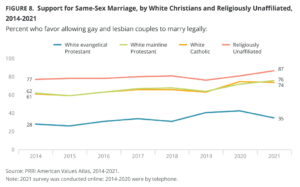 Once again, majorities of all major religious groups now support same-sex marriage — with three exceptions: Latter-Day Saints (46%), white evangelical Protestants (35%) and Jehovah’s Witnesses (22%).
Once again, majorities of all major religious groups now support same-sex marriage — with three exceptions: Latter-Day Saints (46%), white evangelical Protestants (35%) and Jehovah’s Witnesses (22%).
That creates a 33-point gap between white evangelicals and Americans at large — a gap that actually is larger than it appears because white evangelicals are included in the national average.
By contrast, 76% of white mainline Protestants and 74% of white Catholics support same-sex marriage — double the rates of white evangelicals.
The PRRI report summarizes: “Two groups have consistently lagged in support of these three LGBTQ rights issues. Republicans and white evangelical Protestants have consistently been less likely than other groups of Americans to support LGBTQ nondiscrimination protections and same-sex marriage, and they have been more likely to support religiously based service refusals. These groups are not monolithic, however, and pockets of higher and lower support are found when they are disaggregated.”
A surprising finding
One of the peculiar findings when drilling down into the crosstabs of PRRI’s research is that support for nondiscrimination protections for LGBTQ people increases with age among Republicans. This runs counter to almost all conventional wisdom about conservatism in modern America, where it is believed that even younger Republicans are less socially conservative than their older peers.
PRRI found that support for non-discrimination protections among 18- to 29-year-old Republicans has dropped from 74% in 2015 too 64% today. In contrast, support among Republicans over the age of 65 has increased from 52% in 2015 to 63% in 2021.
Related articles:
Anti-LGBTQ legislation is bad science, bad politics and bad theology, and it’s going to get people killed | Analysis by Susan Shaw
Baptist advocates for Equality Act say they are motivated by love of freedom as a faith virtue
American support for Equality Act ideals still growing, new polling shows
Supreme Court to hear case of wedding website designer who won’t serve same-sex couples

